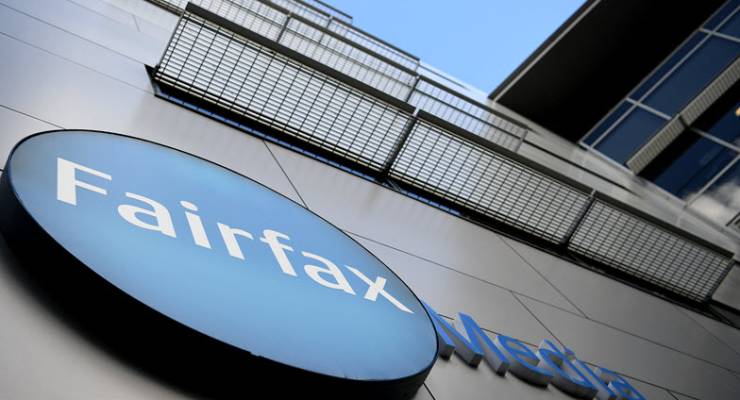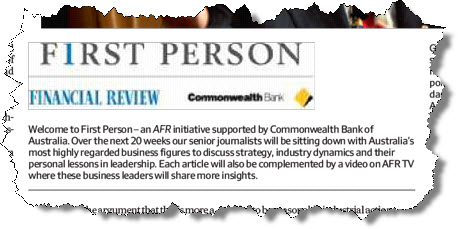
This week, Crikey is celebrating its 20th anniversary, so we’ve taken a look through the archives to bring you some of our biggest and most controversial scoops. Today, the column Fairfax reporter Paddy Manning wrote for Crikey that got him sacked.
Fairfax journo hits out: fear and favour in AFR takeover
April 8, 2013
Today’s rubbishy “First Person” sponsored editorial in The Australian Financial Review is a perfect example of why the business sections of The Sydney Morning Herald and The Age should not be merged with the Financial Review Group — a decision announced by Fairfax last week.
Brought to you by the Commonwealth Bank, it features a rambling interview (plus vision!) with former Business Council president Graham Bradley, who calls for a wave of deregulation by the incoming Abbott government. Bradley declares over the past five years “we’ve not had a government in Canberra that’s been truly respectful of business, interested in business and supportive of business generally”.

Such creeping advertorial — touted as commercially necessary but also fundamentally ideological in its inevitable pro-business slant — has been noticeable in BusinessDay for at least a year: witness the introduction of saleable sections like Executive Style, My Small Business and IT Pro, as well as the use of outside columnists like mortgage broker Mark Bouris, former fund manager Matthew Kidman and even the return of media buyer Harold Mitchell.
The result has been to cramp space for news, features and the opinions and analysis of BusinessDay‘s own reporters and columnists, who are guided by a code of ethics and have no vested interests to push.
The BusinessDay masthead was pinched from The New York Times but has gradually united the business teams of the Herald and Age, has gelled online and is now head and shoulders above any Australian rival in terms of readership, attracting more than two million unique readers a month.
“Too often — even for many of its own hard-pressed reporters’ liking — the result is PR-driven ‘churnalism’ …”
BusinessDay is built on the legacy of reporters and editors like Ian Verrender, Michael West, Adele Ferguson, Ian McIlwraith, Elisabeth Sexton, Stuart Washington and countless lesser-known names who have built up a culture of investigative reporting — holding business accountable — and broken stories that matter not just for business but for the public at large.
BusinessDay writes for the consumer, not for industry. We are not the trade press. With exceptions like Neil Chenoweth that nevertheless prove the rule, The AFR‘s business journalism is built on a fundamental contract between company and reporter: high-level access in exchange for soft coverage.
Too often — even for many of its own hard-pressed reporters’ liking — the result is PR-driven “churnalism” which shows up as “drops” (the poor man’s exclusive, or as Verrender once wrote, the press release a day early), “herograms” for business leaders, unreadable roundtables and conference-linked spreads featuring plenty of happy snaps of business leaders with a glass of champagne or mineral water in hand.
The result also has been a predictable skew on vital topics like climate change and industrial relations.
It is reporting with fear and favour. And you know what? Nobody reads it. Educated readers — The AFR‘s demographic — hate it. Ultimately, even advertisers shun it. It’s a business model for business journalism that had been tried at both The AFR and The Australian. It doesn’t work.
Business readers are not fools. Very often they know more about a given story than the journalist. They want the facts, balance and genuinely independent analysis and commentary. Tell it like it is.
Management of Fairfax Media including Greg Hywood have assured us that politics, business and sport are the heart of its newsroom. The transfer of BusinessDay into The AFR tramples on the legacy of quality, independent, consumer- and reader-driven business journalism established at The SMH and The Age. Both papers will be much poorer for it.
Paddy Manning is a BusinessDay reporter and former national chief of staff for the section. He has worked at The Australian Financial Review and The Australian.
Where are they now
Then-Sydney Morning Herald business journo Paddy Manning’s absolutely savage column on his employer back in 2013 complained of “creeping advertorial” and outside columnists crowding out serious news and analysis.
The piece was a plangent call for change at the Fin and its sister papers, The Sydney Morning Herald and The Age. And change was achieved, in that Manning was immediately sacked.
He landed on his feet, ultimately, covering business for Crikey and writing books about the Greens and Malcolm Turnbull. He’s now the daily editor for The Monthly.
The AFR still relies on cosy relationships with big business for revenue, sponsorship and “prestige”, and as a corollary, has repeatedly shown itself to be out of touch with the non-super rich.
The business sections of Fairfax’s other metro papers were merged with the AFR shortly after Manning left.
Fairfax had a rocky few years. In 2017, it cut 125 editorial positions from its metropolitan newsrooms in cost-saving measures, prompting a seven-day strike, and then had a series of faltering merger attempts. Eventually, it “merged” with Nine to form an all-new company called “Nine”.
At this point, Fairfax’s CEO during the saga, Greg Hywood, took a redundancy. Hywood alienated pretty much everyone who worked for him by buying a Maserati during a round of redundancies in 2014, and was grilled in a Senate inquiry over his reported $7.2 million yearly salary.
His payout, according to the AFR (who you would expect to know these things), was up to $8.2 million.
Charlie Lewis







It’s entertaining to be reminded of these gold nuggets from Crikey’s past.
Correct me if I’m wrong but wasn’t Hywood one of the shortlisted names for the ABC chairmanship?
Harold Mitchell’s pro LNP commentary eventually made its way to the SMH. Quite the cheerleader was our Harold, particularly remember his piece saying all would be well on the businessfront once Abbott was elected.
Laughably, irrevocably wrong.